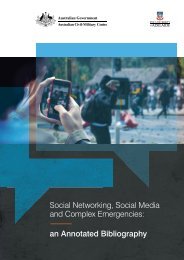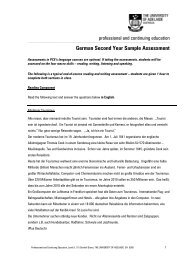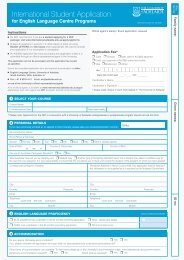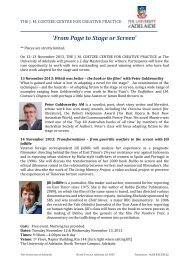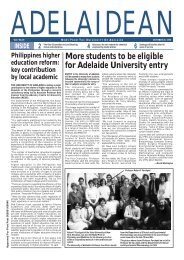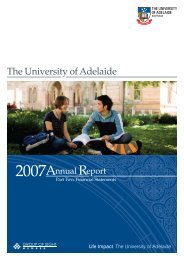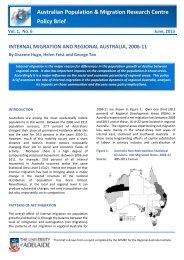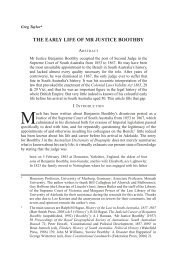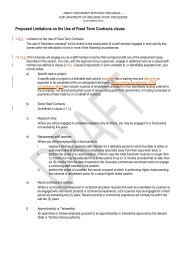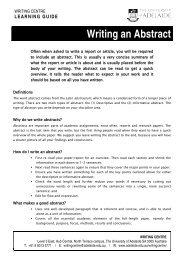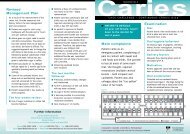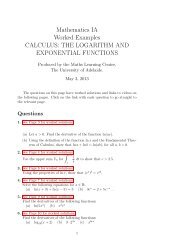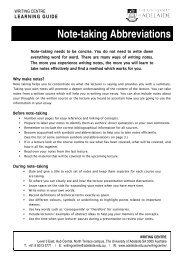Unbridling the Tongues of Women - The University of Adelaide
Unbridling the Tongues of Women - The University of Adelaide
Unbridling the Tongues of Women - The University of Adelaide
You also want an ePaper? Increase the reach of your titles
YUMPU automatically turns print PDFs into web optimized ePapers that Google loves.
<strong>Unbridling</strong> <strong>the</strong> tongues <strong>of</strong> women<br />
She did make a contribution to <strong>the</strong> method <strong>of</strong> distributing preferences, however.<br />
When <strong>the</strong> surplus votes, cast for a candidate who was already elected, were distributed<br />
at full value, <strong>the</strong> results might be different if in counting, <strong>the</strong> preferences were<br />
being taken from <strong>the</strong> top or <strong>the</strong> bottom <strong>of</strong> <strong>the</strong> pile to be distributed. Spence’s first<br />
solution sounded like a recipe for plum pudding: ‘Let all voting papers from all polling-places<br />
be well mixed toge<strong>the</strong>r, and <strong>the</strong>n take <strong>the</strong> votes as <strong>the</strong>y come to hand’. 64<br />
By 1894, she had decided, as have later generations <strong>of</strong> Australians voting in elections<br />
for <strong>the</strong> Australian Senate, that such random distribution in a large election stood<br />
little chance <strong>of</strong> unjustly affecting <strong>the</strong> results. However in 1894 she adopted a suggestion<br />
made by her friend Annie Martin, to give fractional values to all preferences<br />
but <strong>the</strong> first, unknowingly echoing <strong>the</strong> system devised by J. B. Gregory in 1882, and<br />
anticipating its implementation in Tasmania in <strong>the</strong> 20 th century. 65 This <strong>the</strong>n formed<br />
<strong>the</strong> Hare-Spence system <strong>of</strong> proportional representation, embodied in a bill submitted<br />
to <strong>the</strong> South Australian parliament almost every year from 1902 until 1910. 66<br />
Such technical difficulties clearly indicate why Spence’s campaigns never achieved<br />
<strong>the</strong>ir goals. Proportional representation might be <strong>the</strong> ‘fairest’ electoral system that a<br />
democracy can devise. However as recently as 1980, an Australian Senator observed,<br />
‘It is an unfortunate fact, but still a fact, that <strong>the</strong> fairness <strong>of</strong> electoral systems has<br />
a direct relationship to <strong>the</strong>ir complexity’. 67 A political scientist noted, earlier, that<br />
‘Without compulsion, it is possible that <strong>the</strong> numbers voting would have fallen<br />
heavily in protest at difficult and complicated voting methods: e.g. Proportional<br />
Representation in Senate elections’. 68 A different analysis, sharing some <strong>of</strong> <strong>the</strong> concerns<br />
expressed by <strong>the</strong> Reform Movement in South Australia in <strong>the</strong> early 1890s,<br />
might contend that elections, fair or o<strong>the</strong>rwise, are only one <strong>of</strong> several ways in which<br />
states and <strong>the</strong>ir policies can be shaped in capitalist economies. However for Spence,<br />
electoral reform became a creed: it was <strong>the</strong> necessary condition for <strong>the</strong> elevation, educational<br />
and spiritual, as well as economic, <strong>of</strong> all humanity. That conviction dominated<br />
<strong>the</strong> last 20 years <strong>of</strong> her life, becoming so familiar that it was like a habit, so<br />
strong that it threatened to make her a bore, but it was also <strong>the</strong> means by which she<br />
realised her childhood’s ambition for greatness. On <strong>the</strong> platform, Spence achieved an<br />
even more important independence from <strong>the</strong> constraints <strong>of</strong> a patriarchal social order<br />
than she had as a journalist. Moreover, on <strong>the</strong> platform, she was <strong>the</strong>re to hear when<br />
people applauded and cheered.<br />
This <strong>the</strong>y did, throughout her campaign <strong>of</strong> 1892-93. <strong>The</strong> Reform Movement<br />
<strong>of</strong>fered support: its paper Voice reported meetings she addressed; Medway Day as-<br />
134



